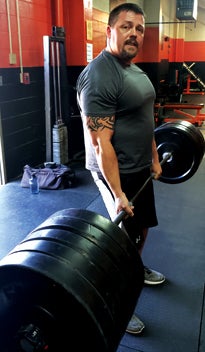Brains and Brawn… Bigger does not always mean stronger
Published 10:32 am Friday, April 16, 2021
|
Getting your Trinity Audio player ready...
|
BY CHAD SALYER
Touchdowns in football, home runs in baseball, goals in soccer.
These are the ultimate moments in those sports. For weightlifting, that moment is the maximum single repetition or the “max” lift.
Competition in this sport is nearly exclusively based on that single feat. This is something that lifters will build up to for weeks or even months and then in that one single rep realize whether all their hard work has translated into increased strength.
There are a lot of things that come into play when “maxing out” on a certain lift. There is, of course, your muscle’s size that plays a role, but also, there is something called neuromuscular facilitation, and muscle density.
These can be even more important than size when it comes to a maximum lift.
Neuromuscular facilitation is your nervous system’s ability to activate more of that muscle tissue at once and to do it instantly. Did you ever watch the Olympic weightlifting events and marvel at the average or even small-sized lifters that completed a lift with more weight than you would ever expect?
This is due to their nervous system being able to activate nearly all their muscle tissue at once.
Another factor that comes into play when lifting a max rep is the density of your muscle tissue.
When I think about this aspect of strength, I think back to a certain powerlifting meet. I competed in the Southern Powerlifting Federation’s (usually called the SPF) national powerlifting championship in 2016 in the 220lb weight class.
I had almost exclusively competed in rigorously drug-tested organizations in my career up to that point, but the SPF does not drug test. So, most if not all my competition for this meet was on some form of steroids.
I was shocked when I looked around at my competitors at how massively muscular they were. I fully anticipated coming in last place for this meet.
As we entered our opening squat weights, I noticed something even more shocking. My squat opening lift was the largest in the group.
For my first squat, I had picked a number 50lbs greater than my closest competitor. After all was said and done, I went on to win that meet by almost 100lbs.
The next day, I was in a local store buying some snacks for the road trip home and a very nice older lady walked up to me. She said, “Son, were you in that weightlifting meet yesterday?”
I told her I was, and she said, “I was so proud of you and how you lifted!” This was such a touching sentiment I was not sure how to reply and so I just let her continue.
She went on to say, “You were just the littlest one out there and you weren’t scared of those big boys.” I could not help but chuckle at her observation and thanked her.
At that point, I began to more fully understand that size is not the same thing as strength. My muscles were “denser” than those steroid inflated guys, and my nervous system was superior.
So, my result was better. Despite being the “littlest one,” I had won.
So, be careful not to judge a lifter based on size. There are more things than size that matter for total strength and they might be a lot stronger than they look.






